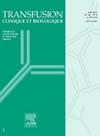Donor-reported stress type affects inflammatory blood markers prior to donation
IF 1.2
4区 医学
Q4 HEMATOLOGY
引用次数: 0
Abstract
Background and objectives
Psychosocial stressors may contribute to inflammation. The aim of this study was to assess soluble inflammatory markers in blood donors’ while they donated, focusing on perceived stress from family, work or from the act of donating.
Materials and methods
Donors answered yes/no questions about stress (family, work, or donation-related) and rated puncture pain (0–9). Blood samples were centrifuged and analyzed by ELISA for inflammatory markers, including cortisol, RANTES, sCD40L, IL-2, IL-4, IL-6, IL-10, and serotonin, focusing on platelet-derived inflammatory factors.
Results
Cortisol levels were higher in donors who experienced blood donation related stress as compared to donors who did not experience any type of stress. The molecule RANTES was only significantly higher in donors who experienced family stress. A significant increase in the concentration of sCD40L in the plasma of the whole sample and female donors is observed only in the group who only experienced stress related to blood donation, but not family or work-related stress.
Conclusion
These findings suggest that stress experienced before blood donation may influence the inflammatory profile of blood components. Further research is needed to explore the impact of donors’ experiences of psychosocial stressors on transfusion outcomes and on blood components characteristics.
献血者报告的应激类型影响捐献前的炎症血液标志物。
背景和目的:社会心理压力源可能导致炎症。这项研究的目的是评估献血者在献血时体内的可溶性炎症标志物,重点关注来自家庭、工作或献血行为的感知压力。材料和方法:献血者回答有关压力(家庭、工作或捐赠相关)的是/否问题,并对穿刺疼痛进行评分(0-9)。血样离心后,ELISA检测炎症标志物,包括皮质醇、RANTES、sCD40L、IL-2、IL-4、IL-6、IL-10和血清素,重点检测血小板源性炎症因子。结果:与没有经历任何压力的献血者相比,经历过献血相关压力的献血者的皮质醇水平更高。分子RANTES仅在经历过家庭压力的献血者中显著升高。整个样本和女性献血者血浆中sCD40L浓度的显著增加仅在只经历与献血相关的压力的组中观察到,而没有观察到家庭或工作压力。结论:这些发现提示献血前的应激经历可能影响血液成分的炎症谱。需要进一步的研究来探索献血者的社会心理压力源经历对输血结果和血液成分特征的影响。
本文章由计算机程序翻译,如有差异,请以英文原文为准。
求助全文
约1分钟内获得全文
求助全文
来源期刊
CiteScore
2.50
自引率
11.80%
发文量
234
审稿时长
36 days
期刊介绍:
Transfusion Clinique et Biologique, the official journal of the French Society of Blood Transfusion (SFTS):
- an aid to training, at a European level
- the only French journal indexed in the hematology and immunology sections of Current Contents
Transfusion Clinique et Biologique spans fundamental research and everyday practice, with articles coming from both sides. Articles, reviews, case reports, letters to the editor and editorials are published in 4 editions a year, in French or in English, covering all scientific and medical aspects of transfusion: immunology, hematology, infectious diseases, genetics, molecular biology, etc. And finally, a convivial cross-disciplinary section on training and information offers practical updates.
Readership:
"Transfusers" are many and various: anesthetists, biologists, hematologists, and blood-bank, ICU and mobile emergency specialists...

 求助内容:
求助内容: 应助结果提醒方式:
应助结果提醒方式:


